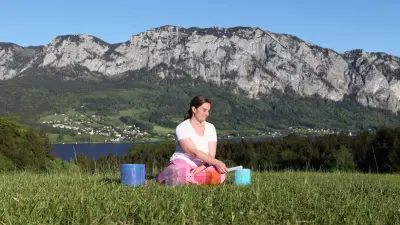How can we find stability in ourselves in difficult times?
Interview with a resilience and mindfulness coach

How can we deal with crises better and change our view of things that challenge us personally? And how can we strengthen our optimism? Kathrin Wahl, responsible for market research in the garden tools unit at Bosch Power Tools, regularly offers resilience and mindfulness training courses, and also works as a meditation teacher and mental health adviser. In this interview, she gives tips on how everyone can work on becoming mentally stronger.
Kathrin, why and how long have you been focusing on the topic of resilience?
I have been working intensively on the topic of mental health for eight years now. We only have one life – and we should live it consciously. My first step into the domain was my training as an alternative psychotherapy practitioner, in which I had to pass a state-approved examination. A two-year coaching course then taught me methods to help people look into what kind of meaning they can give their lives. Now I work part-time as a resilience and mindfulness trainer and have been giving regular talks for several years now. I also offer sound meditation and art therapy.
What motivates you to offer regular resilience trainings for associates?
Our psyche is just as important as our physical health. If our mental health is poor or suffering, we are no longer able to perform to our best. We lose our creative freedom, our flexibility, and our lust for life. My mission is to help people lead a conscious, self-determined life. I have already received a lot of positive feedback from colleagues about my courses. That inspires me every time and shows me that my ideas are welcome and that I can make a difference in people.

How does the topic of resilience shape your daily work?
I have always learned the most about myself in difficult times. They force us to self-reflect, sometimes even to take a step back to get a better look at things. When change happens around us, our view is often limited to the immediate situation. We then need to find ways to regain more self-efficacy – in other words, the conviction that our strengths, talents, and acquired knowledge will help us to overcome difficult situations.
What does resilience mean and why do we need it?
Resilience means being able to cope with life’s adversities and emerge stronger from crises and difficult periods. Resilience is also known as the psyche’s immune system. We are in particular need of stability when times are hard. We can build and cultivate this stability within ourselves, especially when our environment changes and we are faced with new challenges. There are eight pillars of resilience that can help us to achieve this inner stability.
What are the eight pillars of resilience?
There are various factors that strengthen our resilience. The first pillar is realistic optimism: We expect good things, even if the situation doesn’t look likely to produce a positive outcome. But this is not to be confused with toxic positivity – we shouldn’t force ourselves to be positive and look at everything through rose-tinted glasses. Instead, we should focus on the positives and not let ourselves be guided by fear. First of all, we should recognize when a phase of life or a situation is difficult for us and why. This is where mindfulness also plays an important role. Evolution has hard-wired us to focus first and foremost on danger, so that we can protect ourselves. What is important, however, is that only 15 percent of our fears actually become true. And 79 percent of these situations are much easier to resolve than initially feared (Source: Dr. Robert L. Leahy, 2006).
Only 15 percent of our fears actually become true.

What other pillars of resilience are there?
The second pillar is future orientation: We look ahead and pursue our goals. The third pillar is self-efficacy: We make use of our strengths, gifts, and talents to actively determine our lives and work towards positive change. The fourth pillar is solution orientation: We look for solutions instead of constantly circling around the problem. The fifth pillar is network orientation: We need a stable network of people who support us and give us stability, including mentally. The sixth pillar is taking responsibility for ourselves: We don’t see ourselves as victims, we shape our lives actively. The seventh pillar is acceptance: This is about opening ourselves up to all aspects of life and overcoming resistance, because resistance paralyzes us. The eighth pillar is recreation.
It is possible to practice all this?
Yes, and that’s the good news. There are exercises of different types and intensities that help to strengthen the pillars of our resilience. We can easily integrate many of these exercises into our everyday lives. However, it is important to note that resilience isn’t some kind of magic fairy dust that you sprinkle over your everyday life whenever you need it. Working on your own resilience requires a conscious decision and a lot of discipline.
Summary
Resilience is the ability to overcome life's challenges and emerge stronger from them – the immune system of the psyche, so to speak. With self-reflection and discipline, everyone can learn to strengthen their own resilience. There are eight pillars that you can actively work on.

